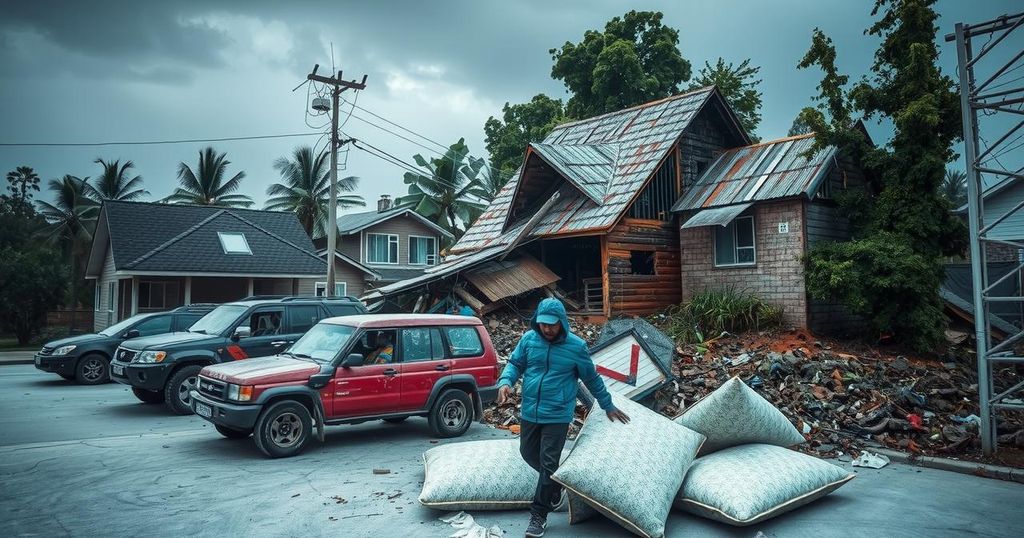Weather
World news
AFRICA, BLANTYRE, CHI, CHIDO, CHIP, CHIPILIRO KHAMULA, COMOROS, COMOROS ARCHIPELAGO, DEATH TOLL, DEPARTMENT OF DISASTER MANAGEMENT AFFAIRS, DISASTER MANAGEMENT, FLOODING, FLOODS, INDIAN OCEAN, KASUNGU, KHAMULA, LILONGWE, LUCY MTILATILA, MACHINGA, MADAGASCAR, MALAWI, MALAWI DEPARTMENT OF CLIMATE CHANGE AND METEOROLOGICAL SERVICES, MONSOON, MOZAMBIQUE, NACALA, NATURAL DISASTERS, SALIMA, U. N. OFFICE FOR THE COORDINATION OF HUMANITARIAN AFFAIRS
Amira Khan
0 Comments
Storm Chido Results in Casualties and Significant Damage in Malawi
Tropical Cyclone Chido has caused at least seven fatalities and impacted over 30,000 individuals in Malawi. Preliminary assessments report extensive damage to infrastructure, and concurrent relief efforts are underway to assist affected households. The storm originated in the Indian Ocean and also devastated parts of Mozambique and the Comoros archipelago, affecting a total of thousands of homes.
The storm known as Chido has tragically resulted in the deaths of at least seven individuals in Malawi, with more than 30,000 others impacted. According to a preliminary assessment from Malawi’s Department of Disaster Management Affairs, many structures, including schools and health facilities, suffered significant damage as roofs were blown off. The department reported that 7,721 households, equating to 34,741 individuals, were affected due to the storm’s devastating impact.
Disaster management spokesperson Chipiliro Khamula indicated that the fatalities occurred in several districts, notably including three in Salima, alongside one each in Kasungu, Machinga, Blantyre, and Lilongwe. The storm has also left at least 16 individuals injured. Tropical Cyclone Chido originally formed in the Indian Ocean, northeast of Madagascar, and made landfall near Nacala, Mozambique, on Sunday, leading to widespread destruction.
A report from the United Nations Office for the Coordination of Humanitarian Affairs highlighted the extensive damage, stating that over 174,000 people were affected in Mozambique, while an additional 64,000 residents in the Comoros archipelago faced similar challenges, with thousands of homes destroyed. After Chido’s remnants passed through Malawi on Monday as a moderate tropical storm, heavy rains and flooding affected approximately 17 districts, predominantly in the southern regions.
Lucy Mtilatila, the director for the Malawi Department of Climate Change and Meteorological Services, confirmed that the storm has since dissipated. “Our eyes are on the Indian Ocean in case there will be another development,” Ms. Mtilatila stated confidently, adding, “But so far, so good.” The Malawian government had temporarily suspended school classes as a precaution but has since resumed them.
Khamula further mentioned that all search and rescue teams deployed in affected areas have returned, as the agency collaborates with humanitarian partners to facilitate relief for the impacted households.
Malawi has recently faced severe weather challenges due to Tropical Cyclone Chido, which produced substantial damage both in the country and in neighboring regions. Tropical cyclones are frequent occurrences in southern Africa, particularly affecting Mozambique and Malawi. Understanding the implications of such storms is crucial for disaster preparedness and response in the region. The devastation caused by Cyclone Chido also highlights the vulnerabilities of infrastructure in African countries, underscoring the need for improved disaster resilience strategies.
In conclusion, Tropical Cyclone Chido has taken a heavy toll on Malawi, resulting in fatalities and significant infrastructural damage. The impacts were not limited to Malawi, as Mozambique and the Comoros islands also experienced adverse effects from the storm. The ongoing response efforts by the Malawian government and humanitarian organizations aim to support the affected communities. Continued monitoring of weather patterns is essential to mitigate future storm-related disasters.
Original Source: www.voanews.com




Post Comment